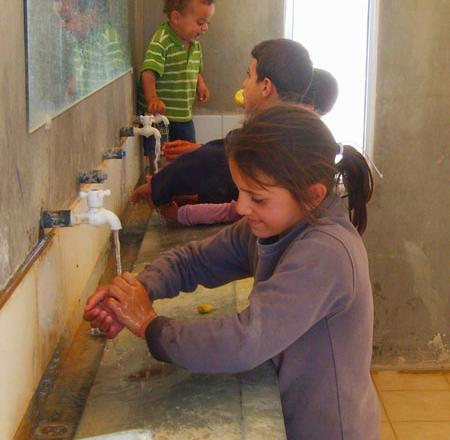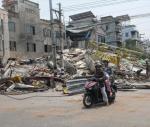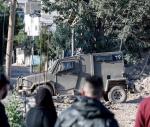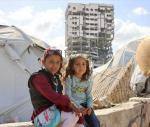You are here
‘Syrian refugees fear they will not see Syria again’
By JT - Mar 11,2014 - Last updated at Mar 11,2014
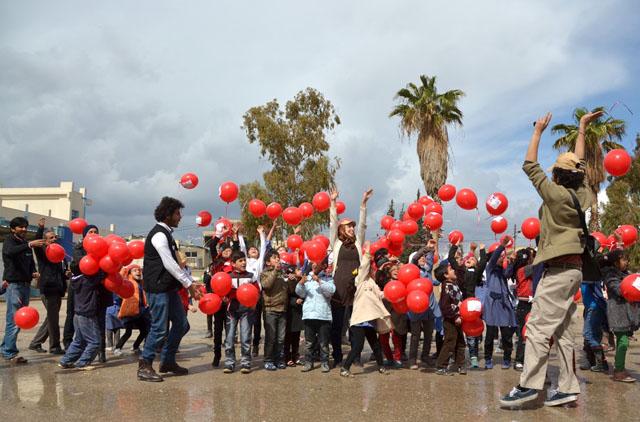
AMMAN — More than 65 per cent of refugees fear they may not be able to go back to Syria despite desperately wanting to return, according to an Oxfam survey.
Oxfam researchers surveyed 151 households of refugees in three areas of Jordan representing 1,015 people.
"While the overwhelming majority of refugees want to return to Syria, just a third of those questioned said they could clearly see themselves returning home. Of these refugees, 78 per cent still said that they did not know when this would be," the aid agency said in a statement sent to The Jordan Times.
Now, with the conflict entering its fourth year, Oxfam said the international community must urgently help end the crisis so refugees and displaced people inside Syria can return home, and start to rebuild their lives.
“The Jordanian government and host communities have been incredibly generous. But with the number of refugees now topping 580,000, Jordan needs strong support from the international community to ensure that people affected by the crisis can live in dignity,” said Geoffrey Poynter, country director of Oxfam’s office in Jordan.
"Governments around the world need to provide sufficient funds for the humanitarian response so refugees and host communities have access to basic services including water and sanitation, food, shelter, healthcare and education,” the statement quoted Poynter as saying.
Refugees were surveyed in Zarqa, Balqa, the Jordan Valley and Jawa, with researchers using electronic handheld data capture for interviews.
“The survey shows that for many refugees hope of returning to Syria sometime soon is dwindling. They are living in limbo, battling each day to survive, with little idea of what the future holds. That must change. Syrians deserve better than this,” said Andy Baker, Oxfam’s regional response director for the Syria crisis.
“Renewed efforts must urgently be made by the international community to help stop the bloodshed and bring an end to this devastating conflict which has destroyed so many lives. It’s time for the next round of the Geneva peace talks to start — and for real and lasting progress to be made around the negotiating table this time,” Baker added.
The humanitarian response to the crisis has called for unprecedented levels of aid so far. The UN has appealed for a record-breaking $6.5 billion, which under-estimates the true scale of the need, Oxfam said.
"A total of $2.3 billion was pledged at the Kuwait donor conference in January, but so far, just 12 per cent of the appeal ($768 million) has been delivered by donor countries since the launch in December," the statement said.
The aid agency voiced concern that unless donor countries find the money "desperately needed" to fund the humanitarian response, then Syrians — both inside Syria and in neighbouring countries — will lack the food, water, shelter, medical care and education they need.
“Plans for a long-term recovery need to be drawn up as even if the conflict were to end tomorrow, Syrians would need assistance for years to come. We urge donor countries to give generously to the UN appeals to help ensure Syrian people — both inside Syria and in neighbouring countries — have the humanitarian assistance they need,” the statement quoted Baker as saying.
“In particular, significant support is needed for neighbouring countries. Basic services in countries such as Jordan and Lebanon are stretched to the limit with schools and health clinics responding to meet the dramatically increased demand,” he added.
Oxfam has helped an estimated 900,000 people affected by the crisis across Syria, Lebanon and Jordan.
In Jordan, Oxfam is working with refugees in both the Zaatari Refugee Camp and host communities by providing water and sanitation facilities, hygiene promotion and waste management, according to the statement.
“No one can go back to our village, it’s too dangerous and life is too difficult… we want people across the world to help us get back to our country," said Abu Mustaffa, a father of seven from Hamra governorate in Syria.
“At the moment, I am not hopeful that there will be any peace, I feel hopeless. We all hope things will get better, but nothing happens. I want to go back to normal life where everything is fine and people have stopped killing each other," added Abu Mustaffa, who now lives in a tented settlement in the Jordan Valley.
“We hope to go back so that our children will return to their schools to learn, to farm their land and be productive in their own country.”
Related Articles
Oxfam has launched a new series of workshops on the occasion of World Water Day (WWD) to raise awareness among Syrian refugees living in Jordan, as well as vulnerable Jordanians in host communities, on the importance of water conservation.
AMMAN — Royal Court Chief Fayez Tarawneh on Sunday met with Oxfam Country Director in Jordan Geoffrey Poynter and stressed that the Kingdom,
The Water Authority of Jordan (WAJ) and Oxfam on Thursday signed an agreement to provide equipment to Balqa Water Directorate.


